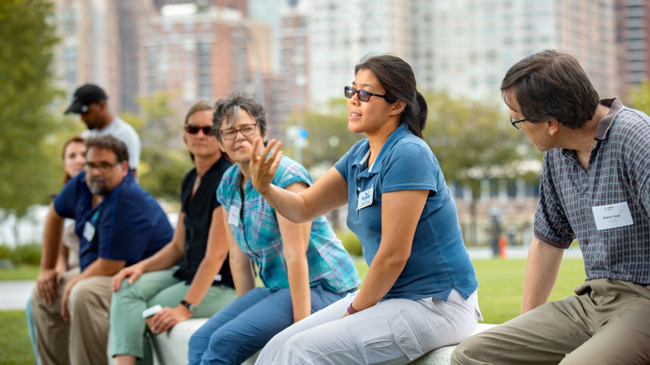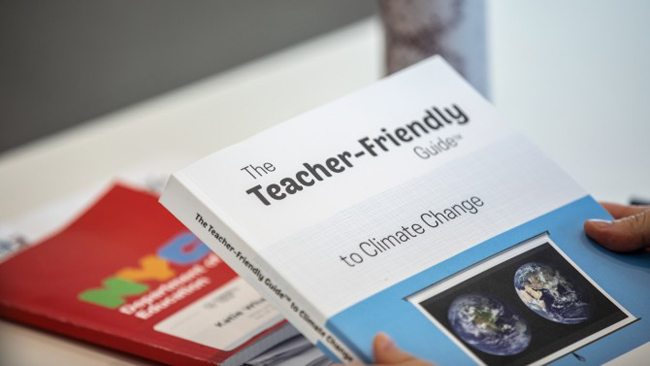— By Syl Kacapyr, public relations and content manager for Cornell's College of Engineering
Published in Cornell Chronicle
Contacts:
Helen Cheng, NYSG’s Coastal Resilience Specialist, E: helen.cheng@cornell.edu, P: (718) 951-5415
Nordica Holochuck, New York Sea Grant, Hudson Estuary Specialist, E: nch8@cornell.edu, P: (845) 340-3983

Helen Cheng, Sea Grant’s Jamaica Bay Coastal
Resiliency specialist lead a hands-on activity with NYC teachers on
measuring sea level rise. Credit: Jason Koski/University Photography.
New York, NY, August 15, 2018 - The Cornell-affiliated Paleontological Research Institution (PRI) has launched a new partnership with the New York Sea Grant (NYSG) program and is in the second phase of a crowdfunding campaign in its quest to bring climate change science to every U.S. high school.
The crowdfunding effort began in 2017 with “The Teacher-Friendly Guide to Climate Change,” a 284-page book that provides teachers with perspectives, statistics and graphics for teaching climate science in the classroom. The book was written by several PRI staff, including Rob Ross, an adjunct professor of earth and atmospheric sciences and PRI’s associate director for outreach.
“It was originally part of a broader impact project we were working on with professor Natalie Mahowald,” said Ross. “Her grant had funds to publish the book, but it didn’t have funds to print and distribute on a broad scale.”
So PRI launched an online crowdfunding campaign to finance distribution of print and digital versions of the book to teachers across the country. Less than a year later, the book has reached 50,000 educators, including every public high school science teacher in New York City and two-thirds of all science teachers in New York state.
With the goal of providing the book to 200,000 teachers, PRI has launched the second phase of its crowdfunding campaign through GiveGab, which has already raised more than $115,000.
Heather Renyck teaches earth and environmental sciences to ninth- and 12th-grade students at Bolivar-Richburg Central School in western New York and said while there are many online climate science resources, it can become difficult to find easily digestible and accurate information.

The book “The Teacher-Friendly Guide to Climate Change,” has reached 50,000 educators, including every public high school science teacher in New York City and two-thirds of all science teachers in New York state. Credit: Jason Koski/University Photography.
“What makes this resource invaluable is the breadth and organization of climate science topics,” said Renyck. “I like the user interface, such as definitions in the margins, online resources in the chapters and useful footnotes. The authors of this book did a great job with making the big picture of climate science accessible to the layperson.”
PRI is also reaching teachers through a new series of workshops being administered with NYSG, a cooperative program of Cornell University and the State University of New York that administers a network of integrated research and education services around the state.
The first workshop, “Climate to Go!,” was held Aug. 7-9 at the New York City Department of Education’s Summer STEM Institute and helped 20 teachers develop activities and approaches to teaching about climate change.
“We thought that it would make sense to partner with colleagues at Cornell who have a physical presence in New York City and have already been working on local resilience issues,” said Ross.
Helen Cheng, NYSG’s Jamaica Bay Coastal Resiliency Specialist located at Brooklyn College’s Jamaica Bay Science and Resilience Institute presented NYC climate change and coastal resilience information. Sea Grant also presented coastal storm awareness research summaries and emergency preparedness go-bags teachers can share with students and families.
The workshop included a full-day visit to Cornell Tech, where teachers toured the sustainably designed campus and practiced a Sea Level Rise field activity using simple surveying tools, setting transects to visualize predicted SLR over time. The field activity is included in a set of lesson plans NYSG developed with the New York State Department of Environmental Conservation's Hudson River Estuary Program.
Nordica Holochuck, NYSG’s Hudson River estuary specialist, said she received positive feedback from workshop attendees who plan to do the activity with their students.
“If a shoreline is available, we have teachers and students practice these transects at a local coastline,” said Holochuck. “This version is correlated to middle school, but can be scaled up to high school and college-level learning.”
There will be ongoing contact with teachers involved in the workshops as they begin to implement climate science lessons in the classroom, according to Alexandra Moore, a senior education associate at PRI. She said PRI will continue to look for opportunities to collaborate with different groups and help provide teachers with the tools they need to educate the next generation.
“Building a community of supporters is important,” said Moore, “and we’re getting people interested in the project, getting people excited in making sure that kids have access to really good education materials, that teachers are really well trained. We’ve got a nationwide cohort of people willing to step up and make sure this happens.”
More Info: New York Sea Grant
New York Sea Grant (NYSG), a cooperative program of Cornell University
and the State University of New York (SUNY), is one of 33 university-based
programs under the National Oceanic and Atmospheric Administration’s
National Sea Grant College Program.
Since 1971, NYSG has represented a statewide network of integrated
research, education and extension services promoting coastal community
economic vitality, environmental sustainability and citizen awareness
and understanding about the State’s marine and Great Lakes resources.
Through NYSG’s efforts, the combined talents of university scientists
and extension specialists help develop and transfer science-based
information to many coastal user groups—businesses and industries,
federal, state and local government decision-makers and agency managers,
educators, the media and the interested public.
The program maintains Great Lakes offices at Cornell University, SUNY
Buffalo, SUNY Oswego and the Wayne County Cooperative Extension office
in Newark. In the State's marine waters, NYSG has offices at Stony Brook
University in Long Island, Brooklyn College and Cornell Cooperative
Extension in NYC and Kingston in the Hudson Valley.
For updates on Sea Grant activities: www.nyseagrant.org has RSS, Facebook, Twitter, and YouTube links. NYSG offers a free e-list sign up via www.nyseagrant.org/nycoastlines for its flagship publication, NY Coastlines/Currents, which is published quarterly. Our program also produces an occasional e-newsletter,"NOAA Sea Grant's Social Media Review," via its blog, www.nyseagrant.org/blog.